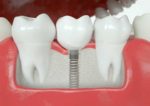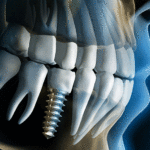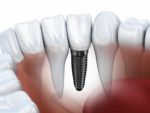Discovering Dental Implant Materials: What Are Teeth Implants Made Of?

Dental implants have become an increasingly popular solution for individuals with missing teeth or those seeking an alternative to dentures. The process involves surgically placing an artificial tooth root, typically made of titanium, into the jawbone, which then fuses with the bone over time. Once the implant has integrated with the jaw, a replacement tooth is attached to the implant, providing a sturdy and long-lasting replacement for a missing tooth. However, with the growing popularity of dental implants, there has been an increasing demand for alternative materials to titanium. In this article, we will explore the various materials used for dental implants and their advantages and disadvantages. While titanium has been the primary material used for dental implants for decades, advancements in technology and materials science have led to the development of alternative materials. These include zirconia, ceramic, and even materials derived from natural sources such as animal bones. Each material has its own unique properties and benefits, and choosing the right one depends on the individual’s specific needs and preferences. Understanding the different materials used for dental implants is crucial for those considering the procedure, as it can affect the success and longevity of the implant. In the following sections, we will delve deeper into the different materials available for dental implants and their respective advantages and disadvantages.
Dental implants are artificial tooth roots that are surgically placed into the jawbone to support a replacement tooth or bridge. They are made up of biocompatible materials such as titanium or zirconia, which fuse with the jawbone over time to provide a stable and long-lasting foundation for the replacement tooth. Dental implants are a popular choice for individuals who have lost one or more teeth due to injury, decay, or periodontal disease, as they offer a permanent solution that looks and functions like natural teeth. With proper care and maintenance, dental implants can last a lifetime and improve the quality of life for those who have lost teeth.
Understanding implant materials is crucial when it comes to dental implants as it can have a significant impact on the success and longevity of the implant. Implants are typically made of materials like titanium or zirconia, and each material has its unique benefits and drawbacks. An in-depth understanding of these materials can help dentists select the best option for their patients, taking into account factors like the patient’s oral health, the location of the implant, and the patient’s budget. Additionally, understanding the properties of implant materials can help patients make informed decisions about their dental health and choose the best implant option for their needs. Therefore, it is of utmost importance to have a thorough knowledge of implant materials to ensure the best possible outcomes for dental implant procedures.
Titanium

Titanium is a versatile and durable metal that has revolutionized the field of dental implantology. It is the most commonly used material for dental implants due to its biocompatibility, corrosion resistance, and strength. Dental implants made of titanium have a success rate of over 95%, making them a reliable and long-lasting solution for tooth replacement. The use of titanium in dental implants has several advantages over other materials. One of the most important benefits is its ability to integrate with the surrounding bone tissue. This process is known as osseointegration, and it allows the implant to become a permanent part of the jawbone. This not only provides a stable foundation for the replacement tooth but also stimulates the bone tissue to prevent bone loss. Additionally, titanium implants are resistant to corrosion and wear, making them a durable and low-maintenance option for tooth replacement.
Titanium is a highly sought-after dental implant material due to its unique properties that make it ideal for use in dentistry. It is a biocompatible metal, meaning it does not elicit an adverse reaction from the human body and can easily integrate into the surrounding bone tissue. Moreover, titanium is incredibly strong and durable, making it an ideal material for implants that are meant to withstand the daily wear and tear of chewing and biting. Its resistance to corrosion and ability to maintain its shape and size over time also make it a popular choice among dental professionals. Overall, titanium’s excellent biocompatibility, strength, and durability make it a reliable and commonly used material for dental implants.
Titanium implants are a popular choice for dental implant procedures due to their durability, biocompatibility, and success rate. One of the primary advantages of titanium implants is that they can easily fuse with the jawbone, providing a stable foundation for the replacement tooth. Additionally, titanium is strong and lightweight, making it an ideal material for implants. However, there are some disadvantages to using titanium implants. One potential drawback is that some patients may have an allergic reaction to the metal. Additionally, titanium implants can be more expensive than other materials, and the process of placing them can be more invasive than other implant procedures. Overall, while there are some drawbacks to using titanium implants, they remain a popular and effective option for dental implant procedures.
Clinical studies have demonstrated the effectiveness of titanium implants in providing a long-lasting and stable option for replacing missing teeth. Titanium is a biocompatible material that is capable of integrating with the surrounding bone tissue, resulting in a strong and durable bond. It has been shown to have a high success rate, with studies reporting implant survival rates of over 95% after 10 years. Additionally, titanium implants have been shown to have low rates of complications, such as infection and implant fracture. These findings have made titanium the material of choice for dental implant placement, with many dentists using it as the go-to option for their patients.
Zirconia

Zirconia is a ceramic material that has revolutionized modern dental implants. It is a type of crystal that is derived from zirconium, a silvery-white metal. Zirconia is known for its excellent mechanical properties, such as high strength, toughness, and resistance to wear and corrosion. These properties make it an ideal material for dental implants, which must withstand the constant stresses and strains of chewing and biting. Zirconia implants are biocompatible, meaning they are not harmful to the human body. They are also highly aesthetic, as they can be color-matched to natural teeth, giving patients a natural-looking smile. Zirconia implants are a popular alternative to traditional titanium implants, which can cause allergic reactions in some patients. Zirconia is also a more suitable material for patients with thin gums, as it does not cause the grey line that can sometimes appear around titanium implants. Zirconia implants are also more resistant to plaque and bacteria build-up, making them a healthier option for patients. Overall, zirconia implants offer numerous benefits over traditional implant materials, making them a popular choice for patients seeking a durable, long-lasting solution to missing teeth.
Zirconia, a newer dental implant material, is a ceramic material that has been gaining popularity in recent years. It is known for its strength, durability, and aesthetic appeal. Zirconia implants are biocompatible and are resistant to corrosion, making them a great alternative to traditional metal implants. Additionally, zirconia implants are less likely to cause allergic reactions in patients, making them a safer option overall. The white color of the material also makes it a great choice for implant-supported crowns in areas where esthetics are a concern. While zirconia implants may be more expensive than traditional metal implants, their many benefits make them a worthwhile investment for patients seeking a long-lasting, natural-looking tooth replacement option.
Zirconia implants have gained popularity in recent years due to their biocompatibility, durability, and aesthetics. These implants are made of a ceramic material that is strong, resistant to corrosion, and suitable for those with metal allergies. Additionally, zirconia implants have a tooth-like appearance, making them a viable option for those seeking a more natural-looking replacement for missing teeth. However, one disadvantage of zirconia implants is their high cost compared to traditional implant materials, such as titanium. Additionally, zirconia implants may be more prone to fracture under stress, and their long-term success rates are still being studied. Overall, zirconia implants may be a suitable option for some patients, but careful consideration of their advantages and disadvantages should be taken before making a final decision.
Zirconia implants have gained increasing popularity in recent years due to their biocompatibility, aesthetic appeal and low affinity for plaque accumulation. Various clinical studies have been conducted to evaluate the effectiveness of zirconia implants and compare them to traditional titanium implants. A systematic review and meta-analysis of 14 clinical studies revealed no significant difference in implant survival rates between zirconia and titanium implants. However, zirconia implants were found to have a lower incidence of peri-implantitis, a common inflammatory condition that can lead to implant failure. Zirconia implants have also shown to have excellent soft tissue response and can provide comparable osseointegration to titanium implants. While further research is needed to determine the long-term success and durability of zirconia implants, they have shown promising results in clinical studies and are a viable option for dental implant treatment.
Other Materials

Dental implants are a popular solution for people who have lost their natural teeth due to age, injury, or disease. The materials used to make dental implants are critical to their success and longevity. Apart from the widely used titanium, there are several other materials used to manufacture dental implants. Zirconia is one of the most popular alternatives to titanium. Zirconia implants are white in color, which makes them look more like natural teeth than titanium. Zirconia implants are also more biocompatible than titanium, which means they are less likely to cause an allergic reaction. Zirconia implants are also resistant to corrosion and wear, which makes them more durable than titanium implants. However, one of the drawbacks of zirconia implants is that they are more brittle than titanium implants and are more susceptible to fracture. Another alternative to titanium is ceramic implants. Ceramic implants are made of a material called alumina, which is a type of ceramic that is highly resistant to wear and corrosion. Ceramic implants are also more biocompatible than titanium, which means they are less likely to cause an allergic reaction. Ceramic implants are also more aesthetically pleasing than titanium implants because they are white like natural teeth. However, ceramic implants are less durable than titanium implants and are more likely to fracture. Ceramic implants are also more expensive than titanium implants, which makes them less accessible to some patients. In conclusion, dental implant materials have come a long way since the first dental implants were invented. Titanium is still the most widely used material, but zirconia and ceramic implants offer viable alternatives for patients who are allergic to titanium or who want a more natural-looking implant.
Apart from titanium, there are other materials used for dental implantation, but they are not as common as titanium. One of these materials is zirconia, which is a type of ceramic that has a similar appearance to teeth. Zirconia implants are white, and they do not show through the gums, which makes them an excellent option for patients who have thin or transparent gums. Another material used for dental implants is stainless steel, which is used for temporary implants. Stainless steel is not a permanent solution, and it is typically used when there is not enough bone to support a permanent implant. Finally, there are also gold dental implants, which are not commonly used due to the high cost. Gold is a soft metal, so gold dental implants are typically used for front teeth.
When it comes to dental implant materials, there are several alternatives available. One advantage of alternative materials like zirconia or ceramic is their biocompatibility. They are less likely to cause an allergic reaction or inflammation in the patient’s body, making them a safer option. Additionally, these materials are highly aesthetic and can mimic the natural appearance of teeth, enhancing the overall appearance of the patient’s smile. However, one disadvantage of alternative materials is their strength and durability. While they may be a suitable option for front teeth or single tooth restorations, they may not be the best option for molars or full arch restorations that require more strength and stability. Furthermore, these materials may be more expensive than traditional materials like titanium, making them less accessible to some patients.
Clinical studies have been conducted to evaluate the effectiveness of alternative implant materials for dental implants. These studies have shown promising results for materials such as zirconia, titanium-zirconia, and ceramic implants, which have demonstrated high biocompatibility, excellent osseointegration, and long-term stability. Compared to traditional titanium implants, these alternative materials offer improved aesthetics and reduced allergic reactions. However, more research is needed to determine the long-term success rates and potential complications associated with these materials. Despite the potential benefits, the cost of these alternative materials remains a barrier to their widespread adoption.
Choosing the Right Material

Choosing the right material for dental implants is a crucial step in ensuring the success and longevity of the implant. There are several materials to choose from, each with its own unique properties. The most commonly used materials include titanium, zirconia, and porcelain. Titanium is the most popular material due to its strength, durability, and biocompatibility. It is also lightweight and corrosion-resistant, making it an ideal choice for dental implants. Zirconia is another popular material that is known for its strength and aesthetic appeal. It is a ceramic material that is biocompatible and can be used for both implant posts and the prosthetic tooth. Porcelain, on the other hand, is used to create the crown or the visible part of the implant. It is known for its natural look and feel, making it an excellent choice for front teeth implants. When choosing the right material for a dental implant, several factors must be considered. These factors include the location of the implant, the patient’s budget, and the desired outcome. For example, if the implant is in a visible area, then a material like porcelain may be the best option due to its natural look. However, if the implant is in a location that requires significant strength, then titanium or zirconia may be the better choice due to their durability. The patient’s budget is another important factor to consider, as some materials may be more expensive than others. It is important to discuss all options with a dental professional to determine the best material for each individual case.
When choosing an implant material for dental procedures, there are several factors to consider. One of the most important is biocompatibility, as the implant must be tolerated by the patient’s body. Another factor to consider is mechanical properties, such as strength and durability, as the implant must be able to withstand the forces of chewing and biting. Additionally, the material’s surface properties are also important, as they can affect the implant’s ability to integrate with the surrounding bone. Other factors to consider may include cost, availability, and the implant’s ability to be customized to the patient’s specific needs. By carefully considering these factors, dental professionals can choose the best material for each patient’s unique situation.
When it comes to making decisions about dental implants, it is crucial to consult with a dental professional. A dentist can provide valuable guidance on the various materials used in dental implants, including titanium, zirconia, and ceramic. By understanding the pros and cons of each material, patients can make informed decisions about which type of implant is best suited to their individual needs. Additionally, dental professionals can also provide insights into the success rates and longevity of different implant materials, helping patients to choose the most reliable and durable option. Overall, seeking advice from a dental professional is essential for anyone considering dental implants, as it can help ensure the best possible outcome for their oral health and overall wellbeing.
Dental implants are artificial tooth roots that are surgically placed into the jawbone to support a replacement tooth or bridge. These implants are made from various materials such as titanium, zirconia, and ceramic. Titanium implants are the most commonly used and have proven to be highly successful due to its biocompatibility and ability to fuse with bone. Zirconia implants are gaining popularity due to their tooth-like color and strength. Ceramic implants are also an option for those who prefer a metal-free implant. Each material has its advantages and disadvantages based on factors such as cost, durability, and aesthetic appeal. It is important to consult with your dentist to determine which implant material is best suited for your specific dental needs.
The significance of selecting the appropriate material for dental implants cannot be overstated. The material chosen will determine the implant’s longevity and success, as well as the patient’s comfort during and after the procedure. Various materials, including titanium, zirconia, and ceramic, are available for dental implantation, and each has its own set of benefits and drawbacks. While titanium has been the preferred material for many years due to its durability and biocompatibility, newer materials such as zirconia and ceramic may provide better aesthetic results. The selection of the appropriate material for dental implants is critical, and patients should consult with their dentist to determine the best choice based on their individual needs and preferences.
It is highly recommended that individuals consult with a dental professional for further guidance when considering dental implants. Although articles and online resources can provide valuable information, only a qualified dental professional can provide personalized advice based on a thorough examination of your teeth and overall oral health. Additionally, a dental professional can discuss the various materials used for dental implants, such as titanium and zirconia, and help you determine which option is best suited for your specific needs and circumstances. Seeking the guidance of a dental professional will ensure that you make an informed decision and receive the highest quality care possible.
Conclusion

In conclusion, dental implant materials have come a long way since their inception. The discovery of biocompatible materials has revolutionized the dental industry and has given patients a new lease on life. Whether it’s titanium, zirconia, or ceramic, the materials used for dental implants are strong, durable, and made to last a lifetime. With proper care and maintenance, dental implant recipients can enjoy a natural-looking smile, improved oral health, and a renewed sense of confidence. As technology and innovation continue to advance, we can only imagine what the future of dental implant materials holds. Nonetheless, one thing is for certain, dental implants will remain a vital part of modern dentistry and a game-changer in the lives of those who receive them.





